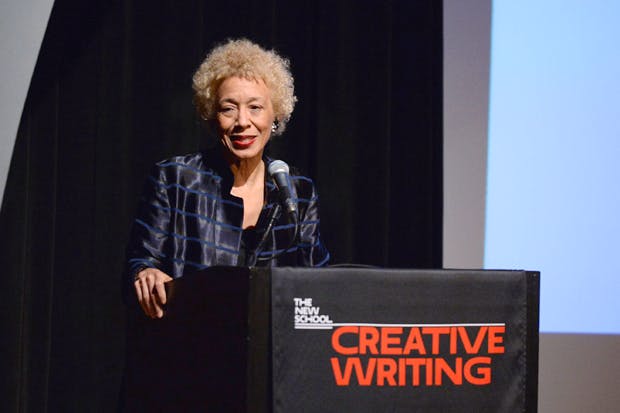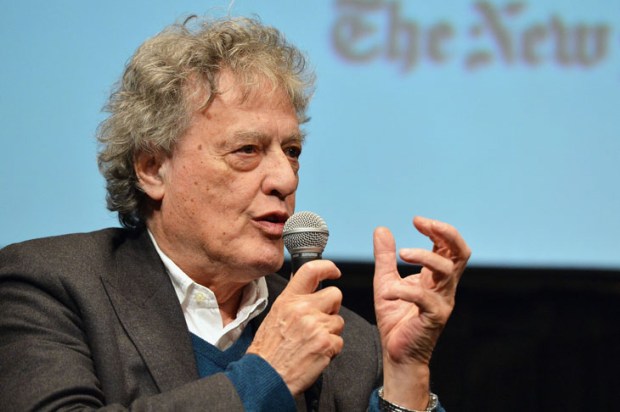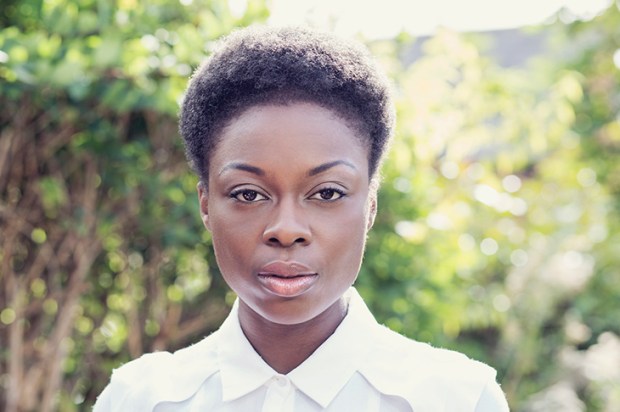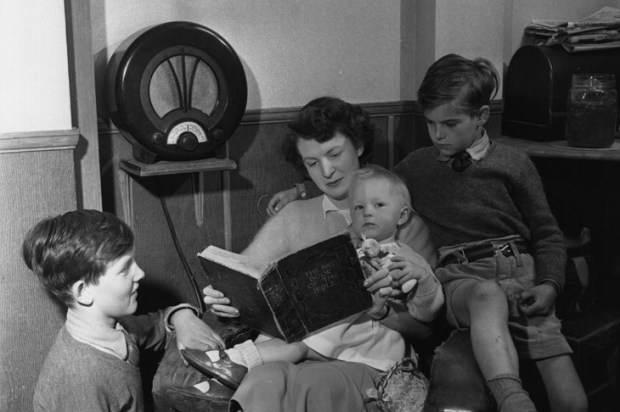Three women, three writers, three very different life experiences. On Monday afternoon the artist Fiona Graham-Mackay introduced us to Imtiaz Dharker, whose portrait she has been painting. While she attempts to capture a visual impression, Imtiaz, who is a poet, tells us what it feels like to be the sitter, the one who is being looked at, drawn, observed with such sharp-eyed scrutiny. A Portrait of… on Radio 4 was one of those seductive programmes that draws you in simply by the quality of the voices and the clear-sighted honesty of what they’re saying. What would it feel like to be painted, and then see yourself as someone else has drawn you? How does the artist know where to begin? With the eyes, the mouth, a first impression?
Dharker was born in Pakistan but grew up in Glasgow in a strict family where rules were made and where she always felt in some way constrained (she describes herself as ‘a Scottish Muslim Calvinist’). As an adult she has always been determined ‘not to be held in’, to be as free as possible in her thinking. Her poems are about cultural intolerance, gender politics, freedom. She was concerned that in allowing herself to be painted, she would somehow be pinned down, like a butterfly, no longer free to change, to reshape and be reshaped. Meanwhile we could hear Graham-Mackay scratching on paper with a stick of charcoal, her preferred way of beginning (‘I love its fluidity’) as she works out how to make sense of the complex woman in front of her.
This was ‘slow radio’ at its best. Nothing much happens as we’re listening but gradually an image emerges — on paper, but also in our heads. At the same time we are slowed down, or rather our thoughts become stilled, lose their hectic hurry, focusing in on what’s being said. It’s the only way to ‘see’ the picture that is being crafted as we listen. It was beautifully produced, too, with just enough music to add colour to the scene but not intrude on it.
On Sunday afternoon we were taken to Brazil and to the home of another poet, also a woman, with a voice so commonplace and down-to-earth and yet at the same time engaged with the mystical and mysterious. In Adélia Prado: Voice of Brazil (also produced by Eve Streeter for Radio 4) we discovered how Prado was first published when, aged 40, she sent off a manuscript of her poems to a leading Brazilian writer. He recognised her gift for clothing the thoughts of a philosopher (and a very wise one) in the language of everyday, writing poems that anyone can understand but that are shockingly insightful too.
Prado still lives in Divinópolis, seven hours from Rio, just two blocks away from where she grew up in a house right beside the railroad track. We heard the trains thundering past, the siren of the factory where her father worked, and just a little too much samba, the music clashing with the poetry. It was her voice we needed to hear.
‘Domestic life kept me calm,’ says Prado, now in her eighties, insisting that she’s just a housewife, in spite of her international reputation. ‘To make coffee and go buy bread. There is my normal life. In the middle is my poetry.’ Her poetry talks about love and loss, about family and the weight of it, but above all it celebrates the littleness of life. ‘In little things, happiness is hiding.’ She also writes about how as a child she was tormented by the enormity of being alive: ‘Compared to my heart’s desire, the sea is a drop,’ she writes (translated by Ellen Doré Watson).
The third of these extraordinary women was heard on Radio 4’s Book of the Week reading from her controversial memoir, Negroland (produced by Jill Waters). Margo Jefferson grew up in Chicago in the 1950s, the child of affluent black parents, her father a paediatrician, her mother a social worker. She was brought up not to be ‘showy’, never to act ‘undignified’ or, worse still, ‘flamboyant’. But this is no misery memoir. Her voice changes tack, insisting that it would be too easy to linger on unhappy memories, on the difficulty of being privileged as a black person. Nor will she fall into the trap of mocking her past, her parents’ efforts to retain what had been so hard-earned.
‘Are we rich?’ she asks her mother, having just been accused of it at school, leaving her feeling ‘anxious and a little queasy’.
‘Are we upper class?’
Her choice of title is deliberate, reclaiming a word that was common in her childhood, indeed was how she thought of herself, her mother telling her, ‘We’re considered upper-class negroes and upper middle-class Americans. But most people would like to consider us just negroes.’
Wisely, she reads the book herself rather than have an actor do it for her, no one else being able to catch her inflection, the feeling behind those words.
Got something to add? Join the discussion and comment below.
Get 10 issues for just $10
Subscribe to The Spectator Australia today for the next 10 magazine issues, plus full online access, for just $10.














Comments
Don't miss out
Join the conversation with other Spectator Australia readers. Subscribe to leave a comment.
SUBSCRIBEAlready a subscriber? Log in